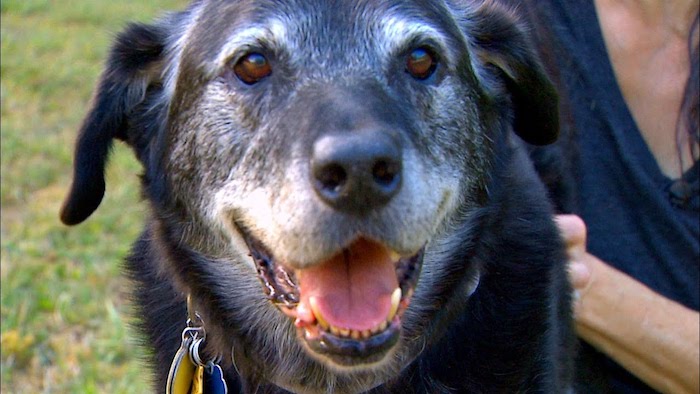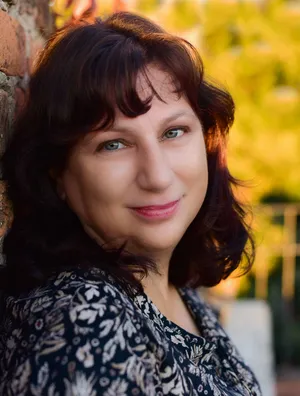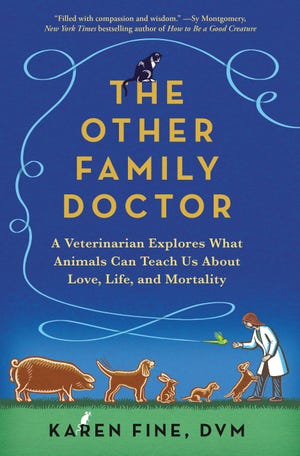
By Meg Trogolo
Veterinarian Dr. Karen Fine has been caring for pets in Central Massachusetts for decades, often doing house calls to treat sick or injured animals. She decided to weave those stories together into a recently released memoir, “The Other Family Doctor,” on the Knopf Doubleday imprint Anchor Books, which has gained nationwide attention.
Last Call caught up with Fine, part of the veterinary team at Leominster-based Central Animal Hospital, to talk about pet loss, adoption, and “vet pets.”

What kind of reception has the book gotten so far?
A lot of the comments I’ve read on Amazon and Goodreads and (that I’ve heard) talking to people are that people feel seen. I just found out it’s on the New York Times bestseller list. They want to look at books that are selling well from many different places. I was on CNN on Saturday and I think that’s what got my name out there.
When did you decide to write “The Other Family Doctor”?
The idea came about because I’m a veterinarian and I see a lot of human suffering as well as animals that need medical care. People are often quite upset, especially when their animals are sick or old and the time is coming to think about euthanasia. I wrote the book wanting to tell some funny stories I had, but the real reason I wrote the book was to tell people what it’s like to be a veterinarian and a pet owner and deal with these decisions around quality of life and end of life. I’ve had the idea for a long, long time.

What’s the book about?
It follows the story of me and a few of my pets, especially a dog I had who got cancer when she was only four. She was the dog of honor in my wedding. It was about six months after that that she got diagnosed with cancer, and it’s about taking care of her and how bonded to her my husband and I were. I see so many people that have these really close relationships with their animals, and I think sometimes people feel like they’re alone in that. It’s not really talked about that much in our society.
Many people have these really close bonds with them, and they especially feel that when they get sick or old and they’re taking extra care of them, when they become a special needs animal for whatever reason. People get so bonded and are so upset when their animal needs extra care that it’s just very difficult, and I think a lot of people feel alone in that situation. I wrote the book to make people feel less alone.
More:Leatherworker helps transform jackets to bags, grief to healing
More:History in the making: Female leaders are shaping Worcester’s future right now
More:Meet Hershey, a ‘gentle soul’ looking for a quiet home
You’ve said that we might want to follow our pets’ example in some ways. Can you talk about that?
I really believe that we have a lot to learn from animals, and as they are dying, I see animals that really seem to accept the fact that they’re dying. I liken it to a dog having puppies or a cat having kittens, where no one’s told them what’s going to happen but they instinctively know what to do.
I think death is like that for them. They don’t think about it beforehand, but when they’re getting these certain signals from their body, they accept it and know what to do. I hear people say that they’re afraid of death, and I don’t feel that animals are afraid of death. It’s not that animals don’t have a survival instinct, but they don’t think about it beforehand, and when it’s happening, they’re able to accept it. People spend a lot of time thinking about fear of death, and it’s probably fear of the unknown, whereas animals don’t spend time thinking about it, yet from what I see, they seem able to comprehend it when it’s happening.
What might people not know about losing a pet?
A lot of people feel upset even when their pet is still healthy, and that’s called anticipatory grief. Some people get very worried and it turns out their animal is fine, but it can really feel overwhelming because we’re so close to them. There are now veterinary social workers, which is a good thing, and I would say try to find somebody to talk to if you’re feeling overwhelmed by your animal’s illness. Also, talk to your veterinarian. That’s why we’re there, to help people make choices so they can make the best choices for their animals. You’re not alone and you’re going to do this with your veterinarian.
How long have you been practicing veterinary medicine?
Thirty years. I always wanted to be a veterinarian. That’s fairly common. Some people went and had another career first, but I always, from when I was a little kid, wanted to be a veterinarian. At the time, I was more likely to get into Tufts because that was my local school. I grew up in Framingham and Sudbury and I settled in Worcester after graduation. I did house calls for 25 years. I stopped doing house calls during the pandemic, and now I’ve been focusing on writing. I also wrote a textbook. I’m still practicing part-time.
Animal hospitals stayed open during the height of the COVID-19 pandemic. What was that like?
It was very difficult, and at the beginning, very scary, because we didn’t know if you could get COVID from someone coughing on an animal and then the animal coming into the clinic. When the vaccines came out, we were lumped in with the general public, so that was also very difficult.
A lot of people got puppies during the pandemic, so there were so many more puppies, which is great, but it was very challenging in terms of fitting everybody in with appointments. Sometimes, there was one person in the family who wanted a pet and the other person said maybe not, and then all of a sudden, everybody was home and it was a good time to get an animal. Some of it was people who didn’t have pets before getting them, and some of it was people who maybe had one dog and decided to get another one. It’s a good time to get a puppy when you’re home all the time because it’s easier to housebreak them.
What’s your advice to anyone who might be looking to adopt a dog?
Take your time. Don’t buy a dog online, because there are a lot of puppy mills advertising online. They’re very good at it, so they say they’re not puppy mills. It takes more time to go through a shelter, because they might want to call your veterinarian and see if you took good care of your previous pet, ask you a lot of questions, but they really are committed to seeing that those animals have good homes.
The term “vet pet” refers to times when veterinarians will adopt pets that need a little more care day-to-day. Have you taken in any animals that way?
Yes. My dog who got sick and had cancer had come into the clinic from animal control, and she had been hit by a car, and she had a broken toe. The other ones I’ve gone looking for, but I always had rescues. I see a lot of animals that need homes, and I know there are a lot of animals out there who need homes.
Complete Article ↪HERE↩!
